Apollo is a monster of a platform. If you’re looking for the crème de la crème of data enrichment tools, it’s no wonder you’ve found yourself eyeing up Apollo.io. It has so many features that you might have to hold your head steady so that it doesn’t spin off.
And that’s where the problems start… And where Apollo.io alternatives become viable.
What is Apollo.io?
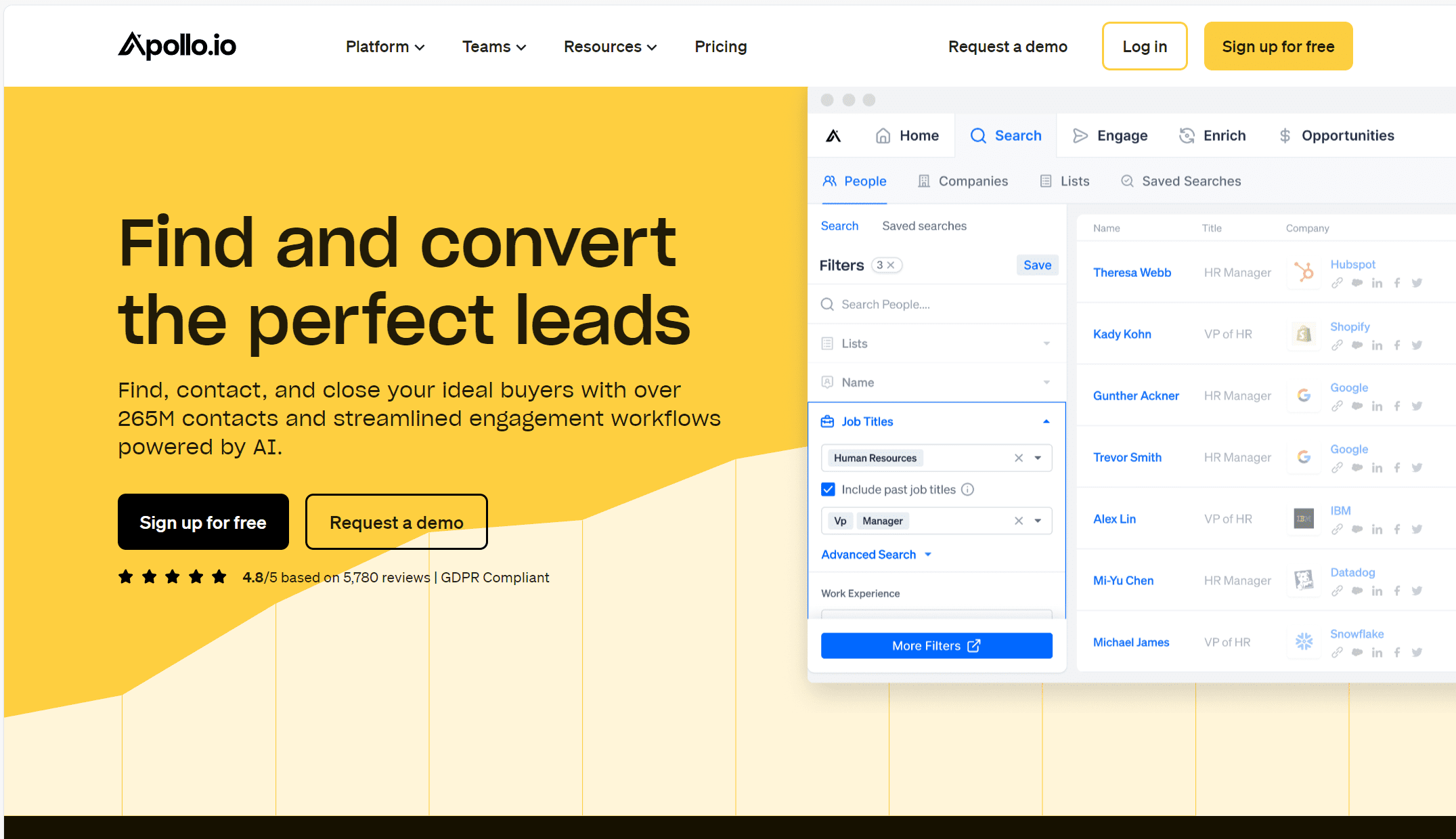
See, Apollo is a fantastic platform. There’s no doubt about it. It has accurate data on the contacts you need to connect with. It can personalize and automate your emails, letting you reach far more prospects rapidly with a higher response rate. It even has a Conversations feature that allows you to record and transcribe sales calls to extract even more data.
There’s a brilliant free plan that empowers you to test out dozens of features. There’s enough integrations to keep your data streamlined across practically any work platform you can think of. And you can even do A/B testing to ensure you’re getting the most out of your data.
However, for a small business just intending to scrape contact data from LinkedIn, for example, is all this a little too much? While Apollo does offer a great free plan, the pricing for the paid plans is a little steep. You get what you pay for – it’s not a problem of quality – it’s just that not everybody needs all these features and could instead just build a LinkedIn scraper in Python.
What Is Apollo Good For?
To decide whether it’s worth checking out Apollo.io alternatives, let’s first take a look at what makes Apollo stand out. Bear with us: there’s a lot of unique features.
- Automatic meeting scheduler: Apollo.io automatically schedules your meetings with leads.
- Apollo AI: Apollo’s state-of-the-art AI is able to generate personalized emails and send them automatically to your leads.
- Goal tracking: Track your targets and smash them out of the park.
- Conversation intelligence: Get AI-powered insights from your video calls.
- CRM integrations: Automatically sync and enrich data to your CRM.
- Analytics: Apollo.io offers pre-built reports and dashboards to display and visualize your analytics in the platform.
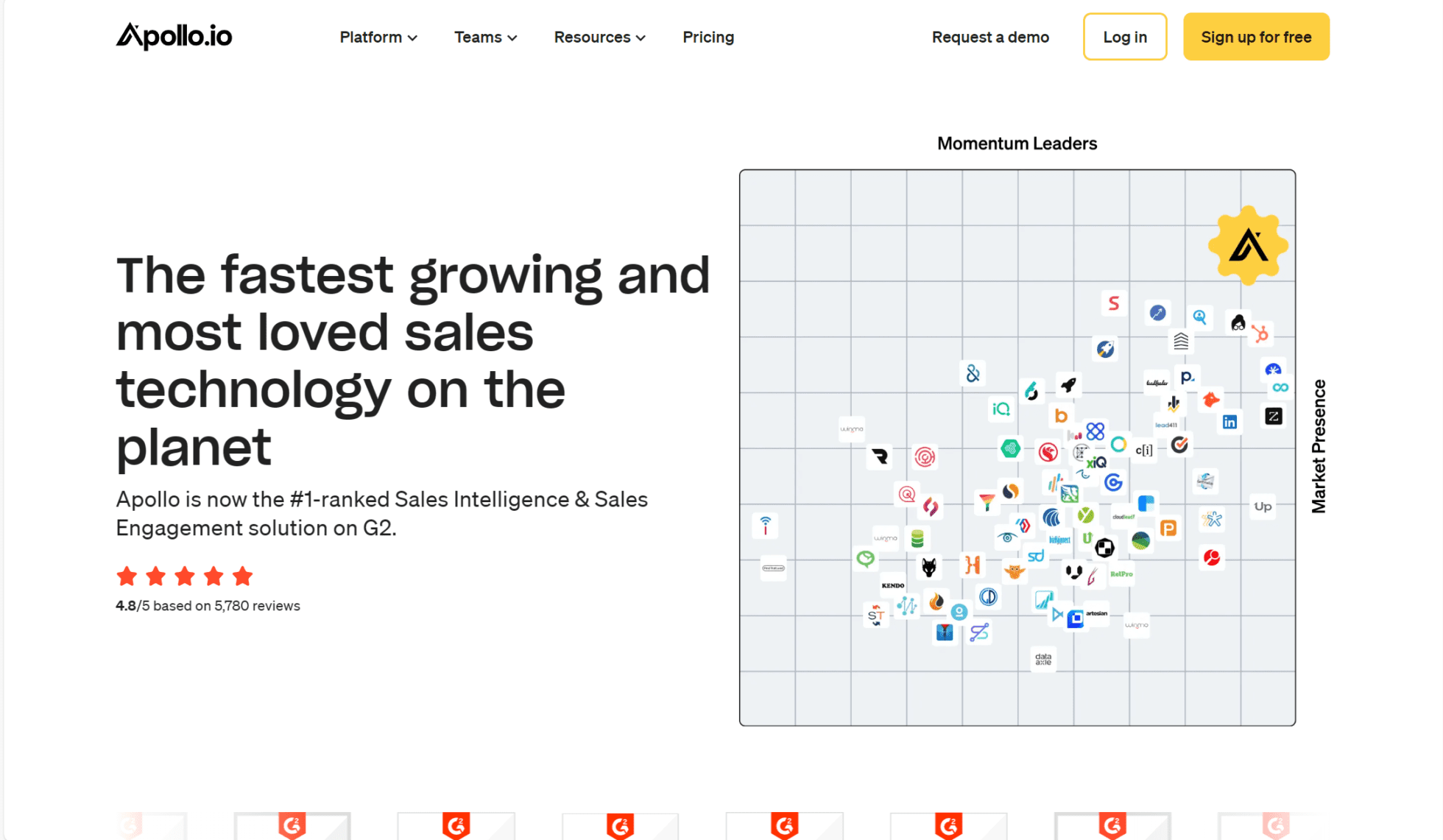
G2 rates Apollo as “the fastest growing and most loved sales technology on the planet.” It’s got over 6,000 reviews at 4.8/5. That’s a stronger rating from more reviewers than any of the Apollo.io competitors on this list – but again, that doesn’t mean it’s the right data enrichment tool for your business. It really depends how simple or complex you want it to be.
Let’s take a look at the pros and cons of using Apollo.io.
Apollo Pros
Personalized and automated: Apollo offers email tracking, cadence automation, and personalized outreach.
Data accuracy: It offers accurate and up-to-date information about companies and contacts.
Comprehensive: Campaign management is possible from within the platform.
Integrations: Apollo integrates with just about any CRM or sales tool you could think of.
Free plan: It has a fantastic free plan so you can give it a whirl without committing to anything long-term.
Apollo Cons
Complex: The amount of features and the complexity of each can be overwhelming for a small business that just wants to focus on data enrichment.
Expensive: The higher end plans for Apollo might be considered expensive compared to other Cognism alternatives.
Apollo Pricing
Apollo’s free plan offers 10,000 free email credits. You can download the LinkedIn extension, send 250 emails per day, and even integrate with Zapier all for free. You can find all the in-depth details about the free plan here.
Apollo’s Basic Plan is $49 per user per month, billed annually, It offers a sharp increase in the number of credits, as well as plenty more integrations. It allows you to move data in bulk (up to 10,000 records at a time). There’s also a 14-day free trial for Apollo’s Basic and Business plans.
The Business Plan will set you back $79 per user per month. This unlocks A/B testing, AI-assisted email writing, and call recordings! Their Conversations feature is also unlocked here: an AI-powered conversation intelligence that provides you with insights straight from your video calls. It’s great that Apollo recognizes how essential it is to extract data insights from video calls, but it’s not as well-equipped to do the job as a dedicated virtual meeting tool like tl;dv.
Finally, Apollo’s Organization Plan is $99 per user per month. This dramatically increases the limits of all features and adds call transcriptions among other things.
5 Apollo.io Alternatives to Boost Your Sales
Now we’ve had a deeper look at Apollo, you might be thinking you want something a little more streamlined. Or perhaps there’s a specific type of feature that you want that Apollo’s vast array is lacking. A real-time search engine for business contacts, perhaps. Or the ability to convert web traffic into hot leads…
Both of those and more are coming up in the 5 top Apollo.io alternatives.
1. Lusha
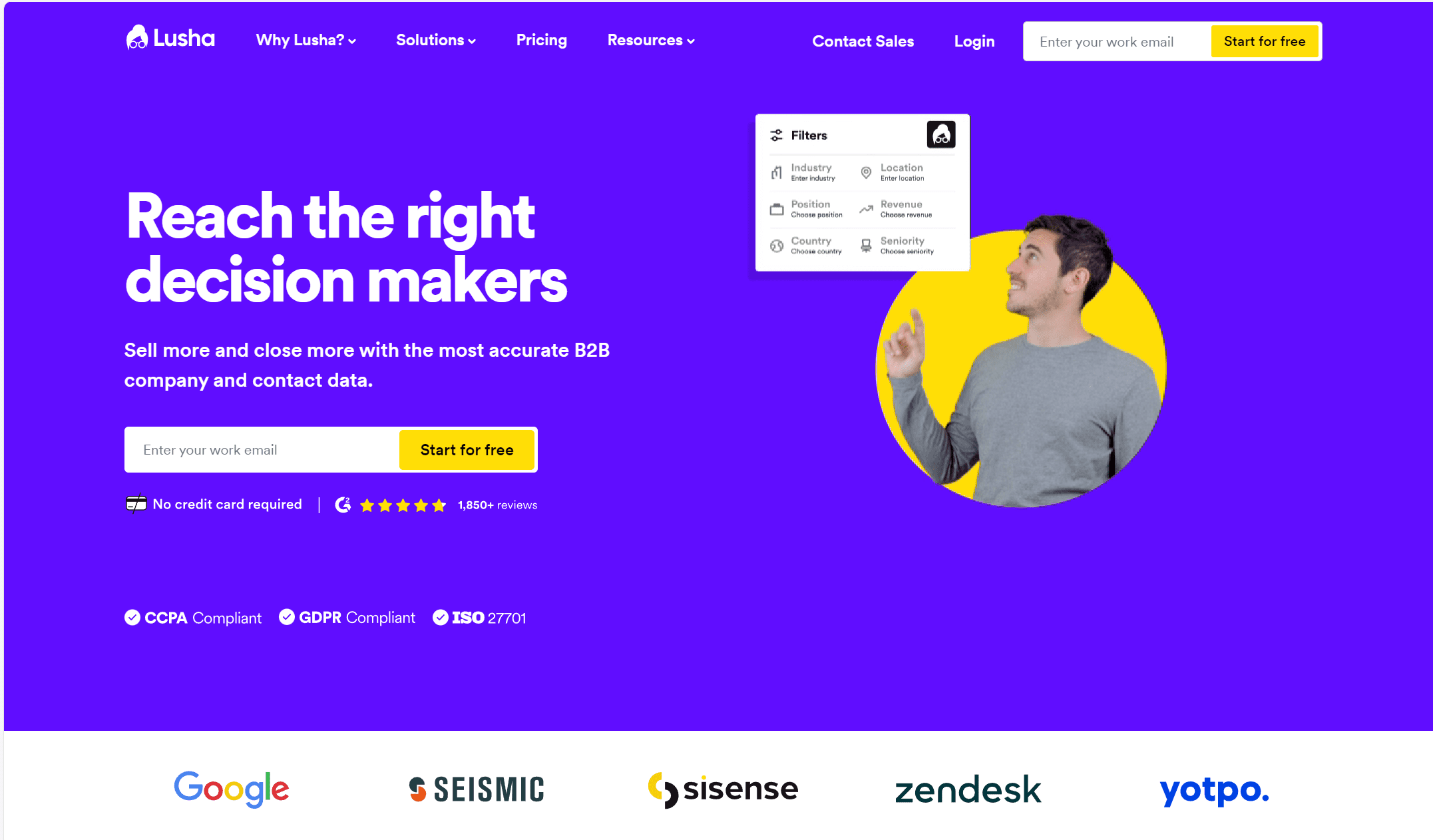
Lusha is a much more simple and streamlined data enrichment tool. It’s designed for B2B organizations and is super easy to get started with. Whether you open it on LinkedIn, Sales Navigator, Recruiter, Salesforce, or any company site, Lusha provides you access to your prospect’s contact details and B2B company info in seconds. This includes phone numbers, email addresses, and potential leads and contacts with other businesses. All the good stuff that you want from a scraper tool.
While Lusha’s feature offerings are relatively basic, that doesn’t stop the platform from having a loyal following. It’s well respected in the data enrichment industry for a reason. It has a straightforward goal, and a straightforward platform to enable you to achieve it.
With accurate and up-to-date contact information, Lusha saves your business time and increases the effectiveness of your sales and marketing campaigns.
Lusha Pros
- Accurate data: Generally, Lusha has high quality contacts and accurate information.
- Integrations: Lots of third-party integrations that make it easy for you to streamline your work.
- Ease of use: Its Chrome and LinkedIn plug-ins are easy-to-use.
Lusha Cons
- Value: Can be a little pricey for what you actually get.
- Relatively Basic: None of Lusha’s features are particularly unique.
Lusha Pricing
Lusha has several paid plans but you can also sign up for free and get 5 credits per month and access to its major features. It’s worth noting that Lusha’s 5 credits seems rather low in comparison to other Apollo.io alternatives (or Apollo itself).
For $29 per user per month, you’ll get 480 credits per month and a few extra features like list management and “bulk” export. The Premium Plan comes in at $51 per user per month for 960 monthly credits.
Finally, if you want to use Lusha’s Scale Plan, you can contact them directly for prices.
Lusha vs Apollo.io: The Verdict
Lusha is a nifty little platform that would make a pleasant addition to any small business’s arsenal. It gets straight to the point and finds you contact information of relevant business contacts quickly. It does what it says on the tin – and that’s it.
However, Lusha’s simplicity can be a hindrance. If you want to maximize the potential from your data enrichment tool then Lusha is nowhere near as comprehensive as Apollo. To demonstrate the sheer gulf in complexity, Lusha’s “bulk” export is capped at a maximum of 25 entries. This is the standard included in Apollo’s free plan, with their bulk export moving 5 figures! This really highlights the gulf between the two when it comes to size and scope.
Put simply, if you’re running a small business and you want a simple sales tool that can immediately take effect and create more leads, Lusha is a fine choice. If you’re running something a little larger in scope and want to give an entire team a software to elevate your sales game from numerous different angles, Apollo might be worth a second look.
**BONUS Sales Tool: Meet tl;dv**
While not specifically a data scraper or enrichment tool, tl;dv is a complementary sales tool that turbocharges your data, regardless of which Apollo.io alternative you’re using.
tl;dv records and transcribes your online meetings, much like Apollo’s conversations, only it comes with specialized features that are proven to boost sales and product development.
For example, tl;dv lets you cut your video calls into clips and highlights. You can add timestamps to make it easy to skip through, tag your colleagues at specific moments, and even make use of the powerful AI summaries and notes that can be ported directly into your CRM of choice.
If data scrapers like Apollo allow you to access the contact info of anyone you need, tl;dv helps you enhance it through qualitative data. Once you’ve got them on a call, tl;dv ensures you remember their goals, weaknesses, pain points, desires, and allows you to store it in your CRM alongside all their contact info. This gives the prospect the feeling of intense personalization, but it gives the sales rep the simplicity of finding all their data alongside their contact information.
While this is ideal for sales, it’s also huge for HR in the interview process for new candidates. There’s also user researchers who can record their user interviews and make use of data insights (in the form of highlight reels) to present research to decision makers and improve the product using the voice of the customer. You can even record internal meetings to improve communication!
How Much Does tl;dv Cost?
With tl;dv’s free plan, you’ll unlock unlimited recordings and transcripts straight off the bat! Get started within minutes – it’s just a few clicks before you can be recording your first meeting. None of this waiting around or jumping through hoops to create an account – it’s as simple and straightforward as it should be. tl;dv’s free plan also offers AI-generated notes, summaries, and action points.
For the Pro Plan, you’re only looking at $20 per month and this unlocks all the top CRM integrations so you can funnel your insights from sales calls directly to your customer relationship management software. With this plan, you can make highlight reels, download calls and transcripts, and integrate with more than 5,000 other productivity tools.
tl;dv Pros
- Free AI Integration: tl;dv uses top-tier AI to provide summaries, notes, and automatic speaker detection.
- Free and Instant Translations: Live transcriptions in 25+ languages for Zoom, Google Meet, and MS Teams.
- Fantastic Free Plan: Unlimited free recordings of Zoom, Google Meet and MS Teams calls.
- Easy to Use: tl;dv has an intuitive design that makes it super simple to use.
- Timestamps and Tagging Features: Timestamp your meeting highlights to quickly jump back to specific moments in the call. It also features the ability to tag colleagues at specific meeting moments so they get an email with a link straight to their inbox.
- Integrates With All Your Favorite Work Apps: Push timestamps and meeting clips directly to Notion, Slack, HubSpot, Salesforce, and more via third-party integrations.
- Create Clips and Highlights: Scan your library and make clips and highlight reels to condense insights.
- Intuitive Library: Search your meetings library for keywords in transcripts to quickly find what you’re looking for.
tl;dv Cons
- Compatibility: tl;dv is not yet available for WebEx or BlueJeans.
Choosing from the list of Apollo.io alternatives is an important decision. But equally important is the tool you choose to complement them with: tl;dv is a no-brainer here.
Let’s take a look at some more Apollo competitors.
2. Hunter
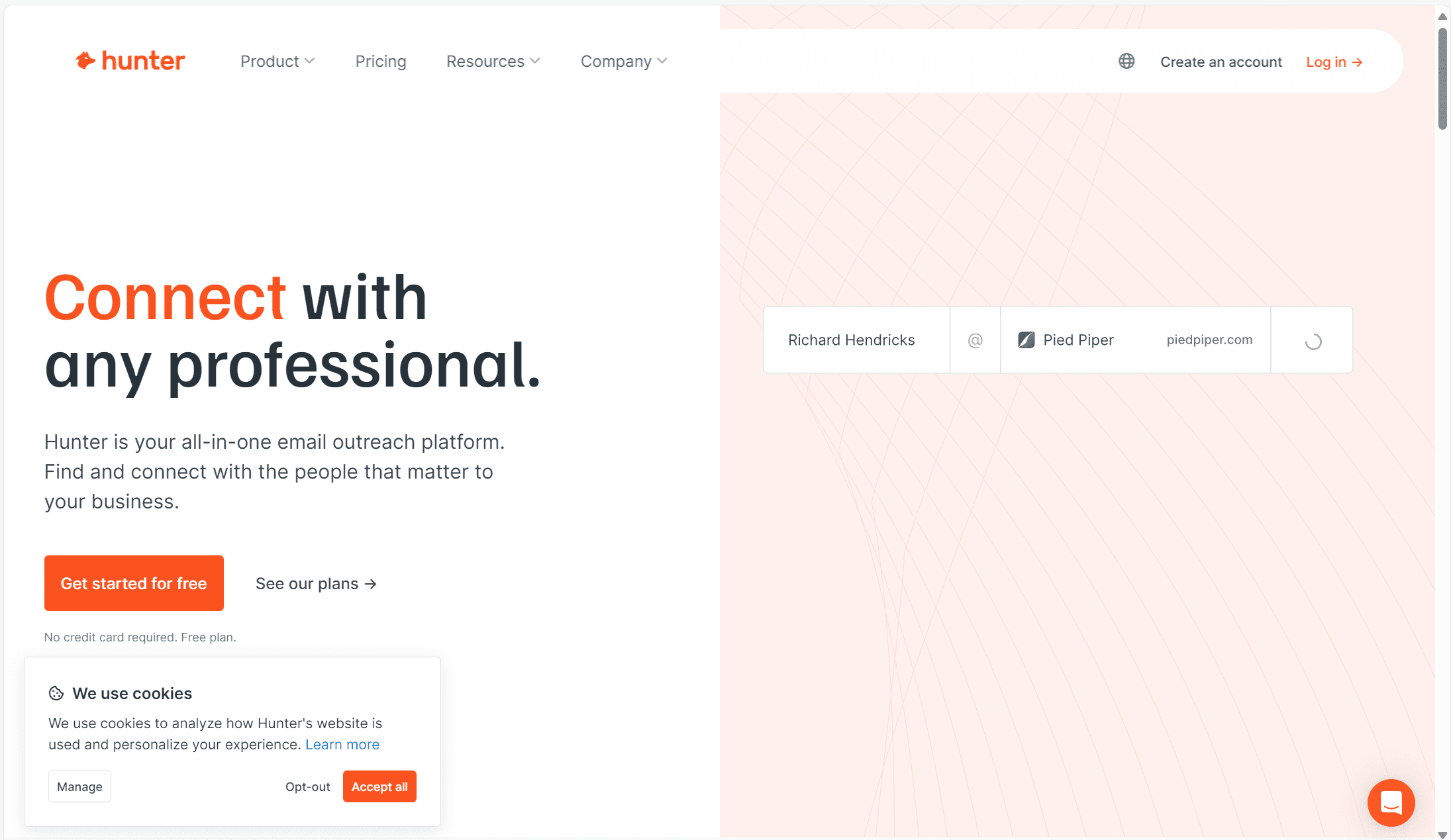
Hunter was built to put you in touch with any professional. It’s a self-proclaimed all-in-one email outreach platform that empowers you to find and connect with the people that matter most to your business. In the end, this is going to generate wonga.
Hunter uses a combination of proprietary technology and artificial intelligence to find, verify, and enrich contact details. It can put you in touch with decision makers almost instantly. This is even more true when you search by domain.
Like other Apollo.io alternatives, Hunter has an array of integrations with CRM platforms as well as other productivity tools. Like Apollo, you can use their own APIs to sync your data to wherever is best for you. Hunter is also recognized as a transparent and compliant company that allows you to stay out of hot water.
Hunter Pros
- Email campaigns: Hunter is great for email campaigns – especially cold emails.
- Search via website domain: You can use Hunter to easily find emails from website domains.
- Email verification:They verify email addresses to protect your sender reputation.
- Ease-of-use: The extension is super simple and intuitive.
Hunter Cons
- Limited data: Compared to other Apollo.io alternatives, Hunter has limited data.
Hunter Pricing
Hunter’s free plan is enough to test it out, but not enough to plunge it for value: 25 monthly searches and 50 monthly verifications.
The Starter Plan will cost you 34€ per month. This unlocks 500 monthly searches and 1,000 monthly verifications. This also allows you to find emails via website domains. You can connect 3 separate email addresses and launch your email campaign to 2,500 people. With this plan, you also get priority support.
The Growth Plan is a hefty 104€ per month and greatly increases the numbers of everything in the Starter Plan. The Business Plan makes the limitations almost pointless, but you’ll pay the price for it: 349€ per month.
Hunter vs Apollo.io: The Verdict
Hunter’s ability to find email addresses directly from domains gives it a unique selling point in comparison to Apollo. But it’s worth noting that Apollo has several such unique features that aren’t found here. Apollo’s A/B testing, conversation intelligence, and its comprehensive analysis suite potentially makes up for its shortcoming here.
It’s worth noting though that Apollo’s standout features are not hyper specific to data enrichment. There are other tools – as proven with tl;dv – that perform the same tasks more strongly. To Hunter’s credit, its search-by-domain feature is directly related to the ability to extract data that will turn leads into customers.
3. Seamless.ai
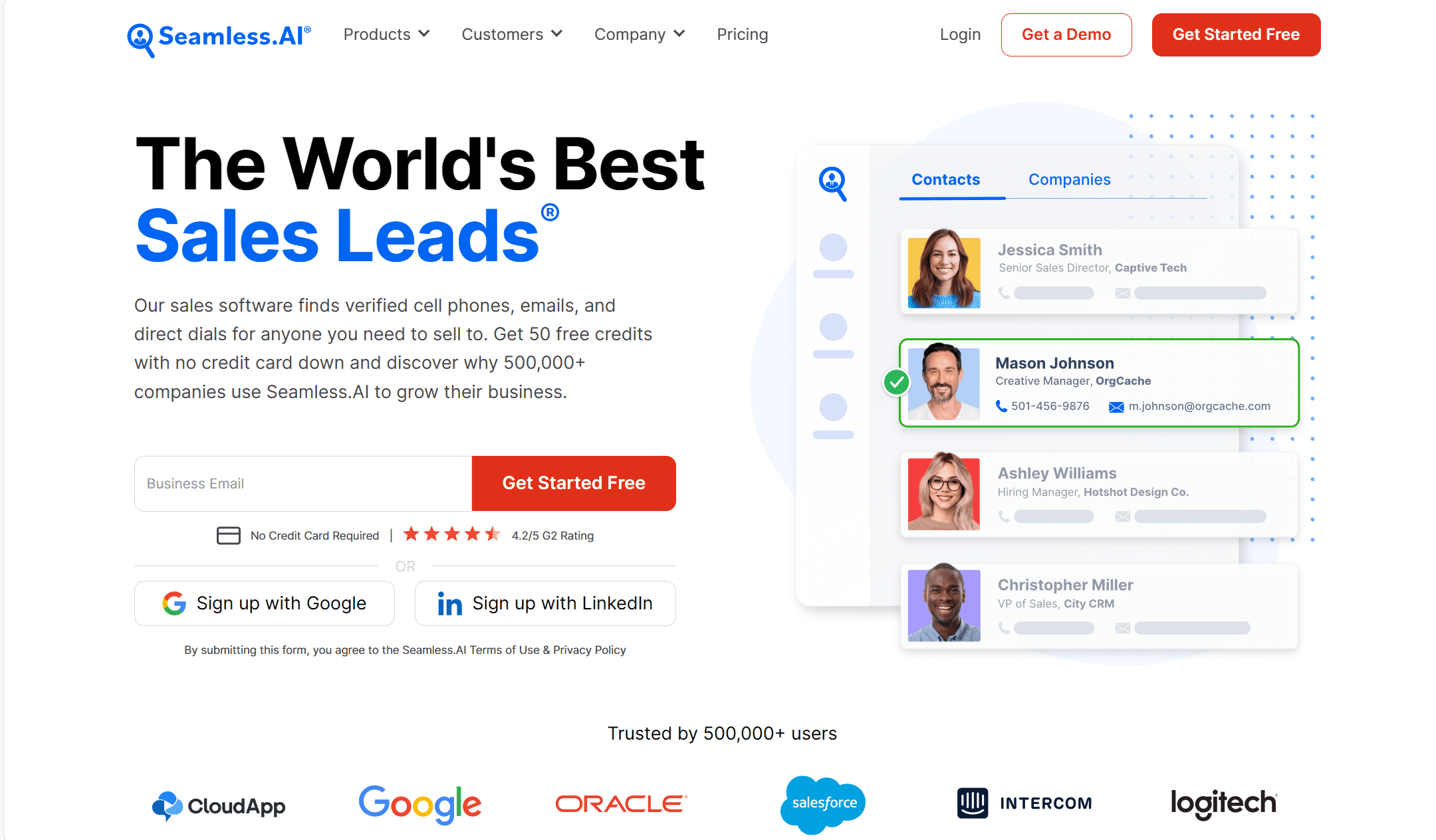
Seamless is another scraper and data enrichment tool that claims to be “The World’s Best Sales Lead.” Their sales software uncovers verified cell phones, emails, and direct dials for anyone you need to sell to. They proudly offer their free version (no card necessary) and invite you to join 500,000+ companies that are using Seamless to grow their business.
Self-dubbed as the first and only real-time search engine for B2B sales leads, Seamless has 1.9+ billion contact and company records that were verified in 2022. On average, they create a 5-10x ROI for your business as it helps you connect directly with your ideal customers so you can build your pipeline, shorten your sales cycle, and close more deals at scale.
Seamless Pros
- Ease of use: Seamless is considered very easy to use, including the LinkedIn extension.
- One-click sync with CRMs: Seamless has tons of integrations and they all work seamlessly.
- High refresh rate: Seamless identifies changes in people’s contact information and updates them.
- Data quantity: With more than 1.9 billion contact and company records, Seamless has a comprehensive database.
- Real-time search engine: Connect directly with your ideal customers.
Seamless Cons
- Low customer reviews: While Seamless talks the talk, the customer says otherwise. It scores just 6.1/10 on TrustRadius from 45 reviews and 3.7/5 on Capterra from 140 reviews.
- Difficult to cancel: Some of the reviews talk about having to jump through hoops to cancel their subscription and still being billed afterwards.
- Poor customer service: Seamless doesn’t seem to excel in making their customers happy.
Seamless Pricing
Seamless doesn’t reveal its pricing on the website. Instead, you have to contact a sales rep. There is a free plan that doesn’t require any credit card to sign up, and there is also a free trial of the Basic Plan – which is basically the same as the free plan but with extra credits and the option to attend a live training webinar.
The Pro Plan offers daily credit refresh as well as Pitch Intelligence, unlimited integrations, job changes announcements, and much more. The Enterprise Plan offers all this with the addition of quarterly business reviews and phone support.
Seamless vs Apollo.io: The Verdict
Seamless sounds like an intriguing Apollo competitor with its real-time search engine and crazy high data quantity. If you’re looking for Apollo.io alternatives that specifically improve upon Apollo’s scraping feature, Seamless might be for you.
Having said that, Seamless suffers from a weaker reputation which can be a real game-changer for businesses looking to build trust with their software providers.
4. Cognism
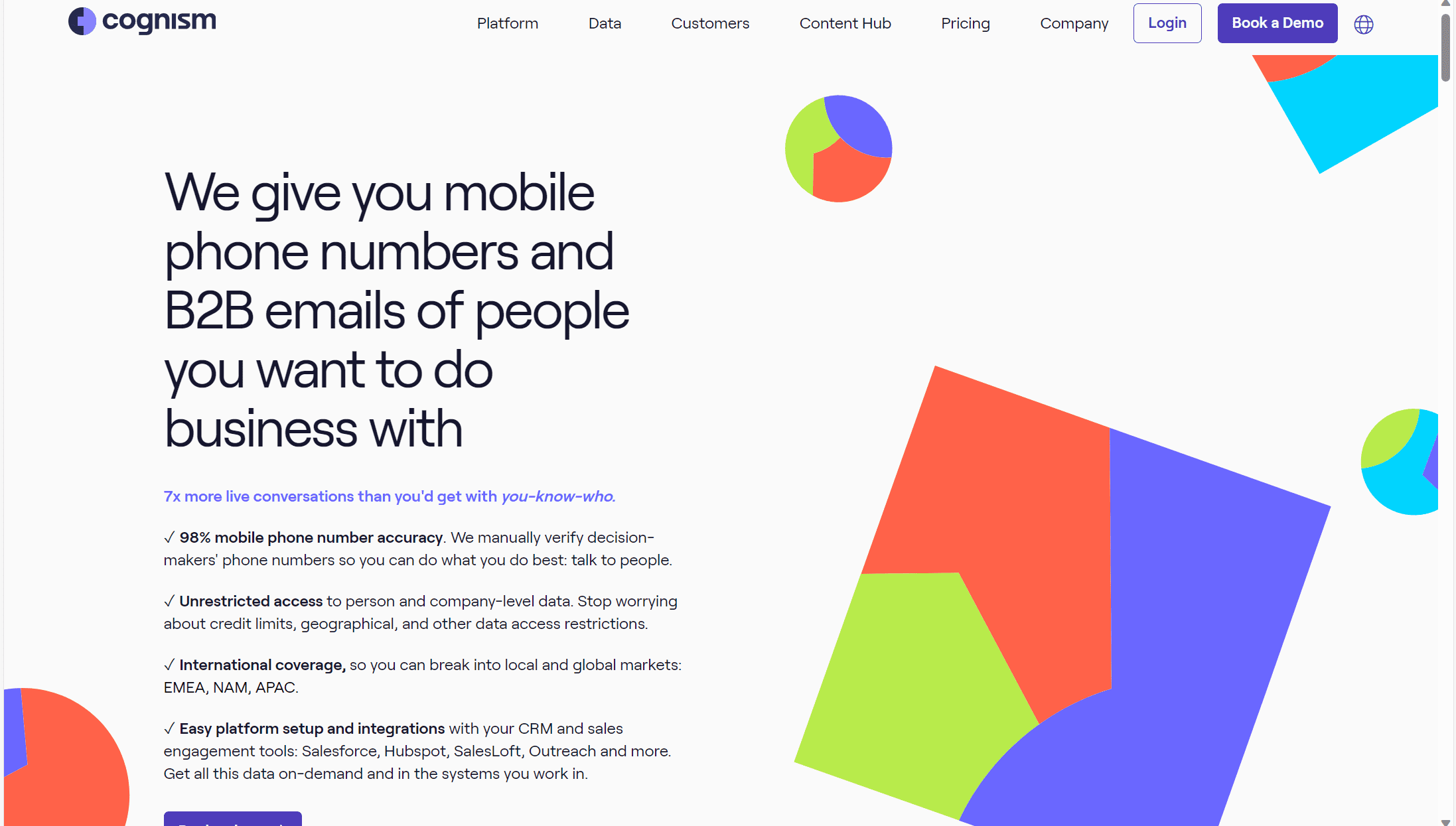
Cognism ensures you have the mobile phone number and B2B email addresses of all the people you want to do business with. Claiming to have 98% accuracy when it comes to mobile phone numbers, Cognism is a platform that strives to keep its data up to scratch.
Like most Apollo.io alternatives, Cognism has many worthwhile integrations. It also has a laser focus on being GDPR compliant. This makes your life so much easier as it scans the Do Not Call (DNC) lists around the world and notifies you which prospects are on them.
All in all, Cognism is a great Apollo alternative for those interested in data quality, quantity, and accuracy.
Cognism Pros
- Data accuracy: Phone number accuracy is quoted as being 98%!
- GDPR Compliant: They advise you if the phone number is on a DNC list.
- International: They have a strong presence in Europe and work internationally.
- Data quantity: They have 70 million phone numbers internationally – more than 2x that of any other data provider.
Cognism Cons
- No free plan: Cognism doesn’t offer you a free plan to try out the features.
Cognism Pricing
Cognism, like Seamless, makes you reach out to them directly before telling you the price.
There is also no free trial. You can book a demo with a sales rep, but that’s it. Perhaps if you speak to them directly, you might be able to arrange one, but it’s not guaranteed.
Cognism vs Apollo.io: The Verdict
Cognism is smaller in scope to Apollo. It focuses solely on scraping contact information from the internet and enriching your data. It does this with a huge quantity of phone numbers – more than double Apollo’s. It also does this while taking compliance seriously.
It really boils down to what you want from your sales platform. Cognism is more focused but less comprehensive than Apollo. It’s also hard to work out Cognism’s value without having to jump through hoops and have talks with their sales teams. Whereas Apollo has a fantastic free plan that you can get started with immediately.
5. Clearbit
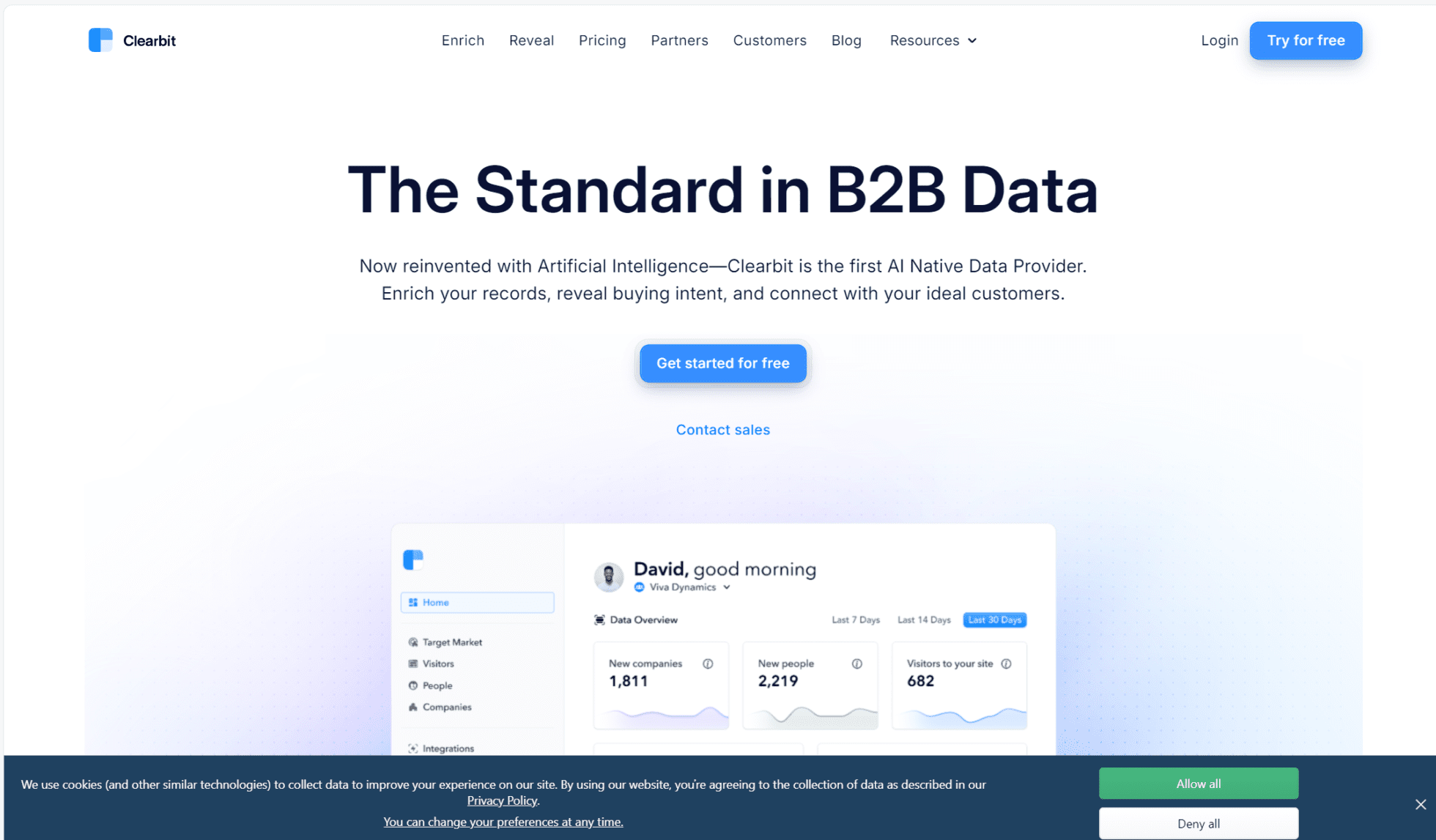
Clearbit is another data scraper tool used by sales teams to get a hold of the right people. It’s a powerful platform with a powerful USP: IP tracking. Got a heavy flow of website traffic? Clearbit converts those visitors into leads automatically.
It comes with a broad database that is reliably updated. It’s relatively straightforward to use and, like Apollo and Hunter, makes emailing large groups of people easy. Clearbit’s machine learning algorithms keep you in sync with the business contacts of your dreams.
Clearbit Pros
- User-friendly: It has a simple and intuitive layout that enables you to seamlessly navigate.
- Integrations: Clearbit has hundreds of integrations to streamline your workflow.
- Emails: Clearbit makes emailing en masse simple.
- Converts traffic into leads: Clearbit turns website visitors into leads with full company profiles. No more cold calling!
Clearbit Cons
- Expensive for small businesses: Small businesses may not get as much value out of the tool as larger ones.
- Inaccurate phone numbers: The phone numbers it provides can often be inaccurate.
Clearbit Pricing
Clearbit’s free plan allows you to utilize the core features of the platform. This includes de-anonymizing your site traffic – the main selling point for Clearbit.
Clearbit’s paid plans have no pricing listed on the website. You have to reach out to their sales team directly to request a quote, much like with Cognism and Seamless.
Their flexible plan structure means you should be able to work out a deal that’s mutually beneficial, regardless of the size of your business.
Clearbit vs Apollo.io: The Verdict
Clearbit is a strong Apollo.io alternative to consider. Its ability to transform website traffic into leads with contact information is a huge feature that none of the other Apollo competitors have. If you have a sizable website, this creates contact information for plenty of potential customers – all of which are already somewhat familiar with your brand.
Apollo, on the other hand, has a kick-ass free plan, straight to the point pricing, and the luxury of an all-in-one sales platform with AI-assisted emails, video call recording and transcribing, A/B testing, and much more. As with some of the other Apollo.io alternatives, Clearbit has a unique feature that is laser focused on improving data enrichment, while Apollo’s features are broader in scope.
At the end of the day, you’ll have to decide the scope of your business. If website traffic is your bread and butter, then Clearbit should not be dismissed lightly.
Which Sales Tool is Best For You?

Data enrichment tools are a dime a dozen nowadays. But that doesn’t mean there aren’t any goodies. Apollo.io is one of the best sales platforms on the market, and prides itself on being an all-in-one UNIT.
However, this isn’t for everyone. Apollo can be a bit much for some people, especially smaller businesses that don’t want to focus too much on learning a new software and would rather just receive a steady flow of contact data when they need it.
For those seeking an alternative to Apollo.io, Lusha, Hunter, Seamless, Cognism, and Clearbit are all fine contenders worth a deeper dive.
But don’t forget the ultimate complementary sales tool: tl;dv. This is especially true if you are not using Apollo as none of its competitors allow you to record, transcribe, and extract data from video calls. But they’re all compatible with tl;dv…





